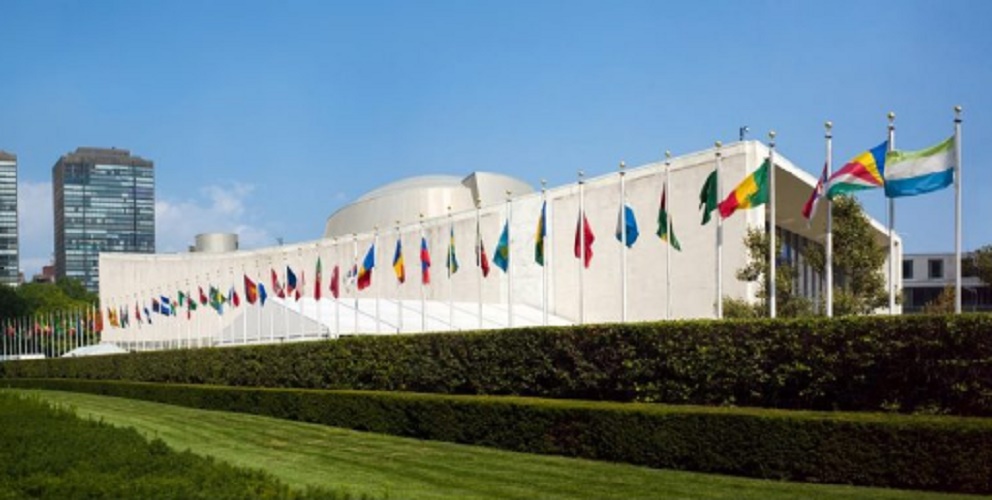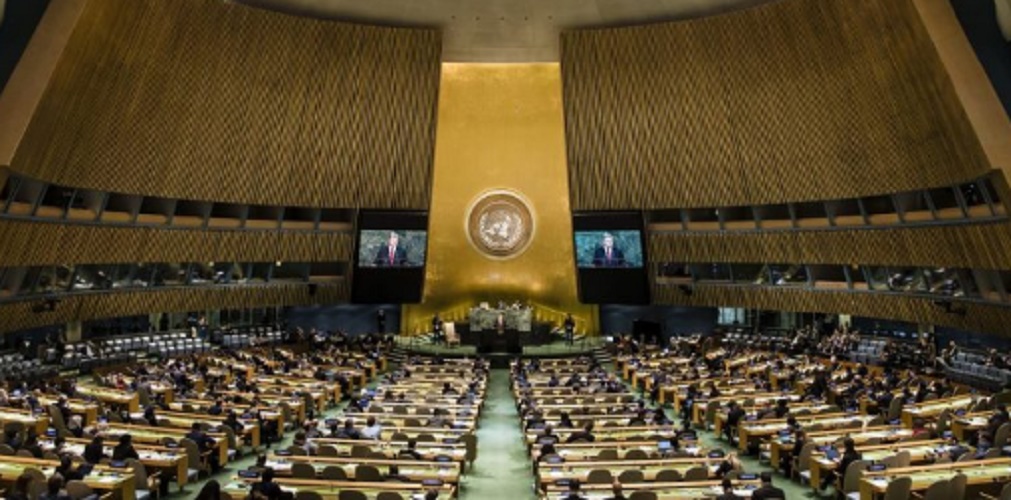What is the UN?
We explain what the UN is, the origin and history of this international organization. In addition, what it is for and the countries that compose it.
-
What is the UN?
The United Nations Organization (UN), also known as the United Nations (UN), is the largest and most important international organization in the world , which brings together most of the nations that exist to discuss and give resolution to dilemmas that affect humanity as a whole.
The UN has a diverse organizational structure, which allows focused discussion of issues and aspects of international interest in platforms and spaces that have the representation of stakeholders and the community of States .
Thus, through a free voting system in the UN, the need to take actions of any kind can be decided : issue international requests for more or less mandatory compliance, intervene through an international coalition in some region of the world that presents conflicts, dangers or needs, etc.
The main organs of the UN are:
- General Assembly . It is the main body of the UN, which allows debate among the 193 member countries. It is directed by an elected president of the assembly for each session, which addresses issues of global importance, such as the recognition of new members or fundamental problems.
- The Security Council . It is formed by five permanent members with veto power: China, Russia, the United States, France and the United Kingdom, the most militarily relevant countries in the world; and ten other non-permanent members, whose membership of the council is for two years and are elected by the General Assembly. The mission of this body is to ensure world peace and decide when it is justified and when not an international intervention.
- The Economic and Social Council . Here are 54 member countries, along with representatives of academic and business sectors and more than 3000 Non-Governmental Organizations ( NGOs ). The purpose of the council is to discuss international episodes of migration, hunger, health, etc.
- The Trusteeship Council . Body that must ensure the proper management of the territories in trust, that is, under the tutelage of the UN to guarantee their development towards their own independent government . It is made up of the five permanent members of the Security Council.
- The International Court of Justice . It is based in The Hague and is the judicial body of the UN, which deals with legal disputes between the various States, and evaluates cases of crimes that are too heinous or have a very wide area of effect to be the jurisdiction of ordinary national courts. It is composed of 15 magistrates elected by the General Assembly and the Security Council for periods of nine years.
- The Secretariat . The administrative body of the UN , serves the other councils and manages around 41,000 civil servants worldwide. It is directed by the Secretary General, elected by the General Assembly for periods of five years.
-
History and origin of the UN

The UN was founded in 1945 in the US , thanks to the agreement of 51 founding countries, which ascribed the Charter of the United Nations, seeking a model of world order that would prevent the repetition of war atrocities such as the Second World War just ended. To this end it replaced the League of Nations founded in 1919 and which was considered unsuccessful.
Since then the UN has reformed its operation numerous times and has grown enormously in terms of acceptance, importance and complexity, although it is also subject to possible criticisms and accusations of partiality or impotence. In this growth the UN has led since 1991 numerous peace missions that not only pursue military purposes, but also civil, social and humanitarian.
-
What is the UN for?

The UN was founded with the main objective of preventing future wars and allowing nations to mediate their conflicts politically and diplomatically before the concert of the other members of the world scene, being able to receive from them opinions, suggestions, offers of help and even demands and organized multilateral pressures.
On the other hand, the UN occupies a place of global importance in the struggle for Universal Human Rights ( Human Rights ) , after it declared them in force in 1948. This is done through various educational, social, humanitarian and military initiatives, as well. as of judicial courts in which to take action against crimes against humanity or war crimes. It is, in broad strokes, an attempt at a world assembly of nations.
-
Countries that integrate it
Currently, the UN is made up of 193 recognized member states, which are:
| Afghanistan | Lebanon |
| Albania | Libya |
| Germany | Liberia |
| Andorra | Liechtenstein |
| Angola | Lithuania |
| Old and bearded | Luxembourg |
| Saudi Arabia | Macedonia |
| Algeria | Madagascar |
| Argentina | Malaysia |
| Armenia | Malawi |
| Australia | Maldives |
| Austria | Mali |
| Azerbaijan | malt |
| Bahamas | Morocco |
| Bangladesh | Mauricio |
| Barbados | Mauritania |
| Bahrain | Mexico |
| Belgium | Micronesia |
| Belize | Monaco |
| Benin | Montenegro |
| Belarus | Mongolia |
| Bolivia | Mozambique |
| Bosnia and Herzegovina | Myanmar |
| Botswana | Namibia |
| Brazil | Nauru |
| Brunei Darussalam | Nicaragua |
| Bulgaria | Niger |
| Burkina Faso | Nigeria |
| Burundi | Norway |
| Bhutan | New Zealand |
| Cape Verde | Oman |
| Cambodia | Netherlands |
| Cameroon | Pakistan |
| Canada | Palau |
| Taste | Panama |
| Chad | Paua New Guinea |
| Chile | Paraguay |
| China | Peru |
| Cyprus | Poland |
| Colombia | Portugal |
| Comoros | Great Britain and Northern Ireland |
| Congo | Russia |
| Ivory Coast | Syria |
| Costa Rica | Central African Republic |
| Croatia | Czech Republic |
| Cuba | North Korea |
| Denmark | South Korea |
| Dominica | Moldova |
| Ecuador | Congo |
| Egypt | Lao |
| The Savior | Dominican Republic |
| United Arab Emirates | Nepal |
| Eritrea | Tanzania |
| Slovakia | Rwanda |
| Slovenia | Romania |
| Spain | Samoa |
| U.S | Saint Kitts and Nevis |
| Estonia | San Marino |
| Ethiopia | St. Vincent and the Grenadines |
| Philippines | St. Lucia |
| Finland | Sao Tome and Principe |
| Fiji | Senegal |
| France | Serbia |
| Gabon | Seychelles |
| Gambia | Sierra Leone |
| Georgia | Singapore |
| Ghana | Somalia |
| Pomegranate | Sri Lanka |
| Greece | South Africa |
| Guatemala | Sudan |
| Guinea | South Sudan |
| Guinea-Bissau | Sweden |
| Equatorial Guinea | Switzerland |
| Guyana | Surinam |
| Haiti | Swaziland |
| Honduras | Thailand |
| Hungary | Tajikistan |
| India | East Timor |
| Indonesia | Togo |
| Iraq | Tonga |
| Iran | Trinidad and Tobago |
| Ireland | Tunisia |
| Iceland | Turkenistan |
| Marshall Islands | Turkey |
| Solomon Islands | Tuvalu |
| Israel | Ukraine |
| Italy | Uganda |
| Jamaica | Uruguay |
| Japan | Uzbekistan |
| Jordan | Vanuatu |
| Kazakhstan | Venezuela |
| Kenya | Vietnam |
| Kyrgyzstan | Yemen |
| Kiribati | Djibouti |
| Kuwait | Zambia |
| Lesotho | Zimbabwe |
| Latvia |





